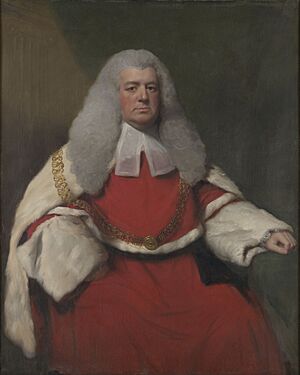James Eyre (judge) facts for kids
Sir James Eyre (born 1734, died 1799) was an important English judge. He served in many high legal positions during his life. He was known for his work in the courts and for helping to shape the legal system in England.
Contents
Early Life and Education
James Eyre was born in 1734, the son of Reverend Thomas Eyre from Wells, Somerset. He received a good education, first attending Winchester College. Later, he studied at St John's College, Oxford, though he left before completing his degree.
Becoming a Lawyer and Judge
Starting His Legal Career
In 1755, James Eyre became a lawyer, which is called being "called to the bar," at Gray's Inn. This was a special school for lawyers in London. He started his work by practicing in the courts of the Lord Mayor and sheriffs of London. He even paid a large sum of money to become one of the four main lawyers for the City of London Corporation.
Key Appointments
- In 1763, he was chosen to be the Recorder of London. This was a significant legal role for the city.
- He was knighted in 1770, which meant he received the title "Sir."
Important Cases and Roles
Sir James Eyre was involved in several important legal cases. He was a lawyer for the person who sued in a famous case called Wilkes v. Wood. In this case, he gave a strong speech against the use of general search warrants, which were documents that allowed officials to search anywhere without a specific reason. His arguments helped protect people's rights.
Later, he became a judge.
- In 1772, he was appointed a Baron of the Exchequer. This was a judge in a special court that handled financial cases.
- He became the Chief Baron of the Exchequer in 1787, which meant he was the head judge of that court.
- From 1792 to 1793, he served as the Chief Commissioner of the Great Seal, a very high legal position.
- In 1793, he was made Chief Justice of the Common Pleas. In this role, he oversaw several important trials, including those of John Horne Tooke and Robert Thomas Crossfield.
Later Life and Legacy
Sir James Eyre was elected as a Fellow of the Royal Society in 1791. This is a group of very smart scientists and thinkers. He passed away in 1799 and was buried in a place called Ruscombe in Berkshire.
 | Emma Amos |
 | Edward Mitchell Bannister |
 | Larry D. Alexander |
 | Ernie Barnes |


